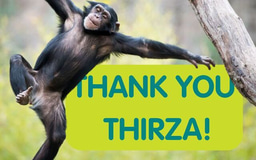How to start up your own conservation organisation. Tip 1: Look before you leap.

I have helped start up 3 conservation organisations so far. By the third one I had a much better idea about what I was doing so thought I would share a few tips in case it helps anyone else avoid the many mistakes I made along the way. So here goes with my first insight……..
I guess (like me) you get excited when you come up with what you think is a great new way of doing conservation. You may then get a bit disheartened when you can’t put your amazing plan into action because you are not part of a conservation organisation that lets them do whatever you like (does such a thing exist?). So why not set up your own organisation to make your conservation dream come true?
The many reasons why you should never set up your own organisation:
- It is mega hard: There is no getting around it. Setting up your own organisation is totally different from having a normal job where you turn up to work. There is no one looking out for your financial, professional, or emotional needs. If you don’t get things organised there is no one that can pick up your slack or give you a break. Time moves on relentlessly while you find out each month an extra big thing you have to do that you were not expecting, that gets in the way of you and the cool work you want to start.
- The admin mountain: Every conservation job has admin, but imagine having to create a mountain of admin for you and anyone you employ to follow. You will not jump out of bed looking forward to saving elephants in Botswana but drag yourself to your desk to start writing a policy on data protection or health and safety.
- No one else knows you exist: As a start up organisation you will be unknown and not valued at all by all the groups you want to care about you like funders, potential partner organisations and anyone else you want to work with or get support from. It may then take years for you to build recognition of your organisation,
- Your monster will need feeding: You will need to pay yourself and everyone you employ, every month without fail. The bigger you grow the more mouths your monster has that need feeding. The constant pressure on your back of having to raise these funds may wear you down as you can never switch off or relax.
- Failure is personal: No matter what excuses you come up with, if your organisation comes crashing down around your ears you and everyone you know will think that it is basically your fault. Something you did just didn’t work. You were not smart or capable enough to make it happen. Time to change your LinkedIn profile from “CEO” to “looking for a job”.
Why you should ignore all the above reasons and just set one up anyway:
- Save more wildlife: If you really do have a great new idea about how to do conservation better, then having your own organisation may help you save more wildlife than you otherwise could if you are constrained by what your boss allows you to do and achieve.
- You pick the team: One of the best things about starting your own organisation is that you get to pick your own team of wonderful people to work with. No more horrible bosses or colleagues to deal with (or at least none that you can’t get rid of).
- When something is broken you can fix it: If you work for someone else’s organisation then you will have to feel the pain (on a daily basis) of everything that is wrong with that organisation. If their finance system does not work you will spend hours and hours sending email requests for help into a void while all the other work you want to do settles in to its place on the shelf. You would then spend most of your break time moaning about how bad the system is with colleagues who are also sharing your pain. If you have your own organisation, however, there is nothing and nobody standing in your way of making things better.
- Unleash your creative side: If you start your own organisation you get to say how it looks and feels through the creation of a whole new brand that represents what your organisation’s values and way of doing things.
- Success is personal: If your organisation survives long enough to start implementing your big idea then there is no escaping the personal satisfaction of being able to make a difference for the wildlife you love.
- You only live once: Enough said.
Having said all that, I would not recommend starting up an organisation to everyone. Only those with the following characteristics may stand a chance:
- A big dose of over confidence: You have got to have a massive amount of self-belief to think that your big idea is going to work and that you are the one that can make it happen.
- A positive, optimistic outlook: You have to believe that you can overcome any challenge and that things will turn out even better than expected.
- A low cost lifestyle: You will probably have very little if any funds when you first start your organisation, so the more frugal you can live the longer you have to bring in the funds you need to put food on the table or a proper roof over your head. Either that or just be very rich to start off with.
If you are on the fence about setting up your own organisation then I would suggest talking to as many people as possible who think you are going to fail – and then go out and prove them all wrong.
If you do think that setting up your own organisation is right for you, then my next post will provide a few tips on how to start setting one up.
I hope others will add their own insights on this topic or post any questions that come to mind.





Please sign in or register for FREE
If you are a registered user on WildHub, please sign in
Thank you Adam for this post, it's evergreen. Like nature, most startups take time but with discipline, consistency, fuelled by your vision; it's better to make your drop of contribution in conservation. It's either way right but personally I would rather live with the satisfaction of trying and see how it goes.
thanks Grace - totally agree - you never know if you don't try!
Thank you, Adam.
I 10000% support every word you put into the article above. I can see it every day and experience (partially) every month (somebody fundraises for salaries) too.
Thanks @Valeriia van der Westhuizen . is a hard road but worth it in the end!
absoslutely
Thank you so much for this article Mr. Barlow. I would love to start to protect giraffes in Kenya especially in my community. I live in a conservancy next to Nairobi National Park and i love the giraffes in these areas however the number of giraffes we loose on road kills is alarming. How do I start an organization without having conflict with the already existing giraffe protecting organizations (i feel they do not do a good job) and how do i go about with the bureaucracy from the government when it comes to registering my organization?
This article is very encourage,
in 2011, i intimated CBO called Akorogbodi community based organization,(ACBO) previously known was Akorogbodi fish farm association (AFF) this Association in South Sudan supported by the local communities and the Kingdom of Azande, Government under the ministry of Agriculture, Word food program through world vision, USAID through UNOPS and Ministry of Physical infrastructure and final UNMISS.
all the necessary documents present, this Association supported a lot and impacted reduced depends on bush meat, for this project was implemented in almost all ten counties in Yambio Western Equatoria State,
i hope for this training of PMWC, more ideas will come in section of wildlife conservation.
Excellent article thank you. Personally I know I’m a “do-er” not an ideas person, and my strengths are different to what it takes to create and lead a business. However, I work tirelessly for a cause I believe in and would love to hear from anyone who is looking to start a new organisation and build a team that I could be part of. Consider me available for hire!
Nothing good comes easy. Being a contributor to a good course or well a lead through your own set organization are all means towards achieving a set goal. Thank you Adam for this article. Many hands do light work. together we can build